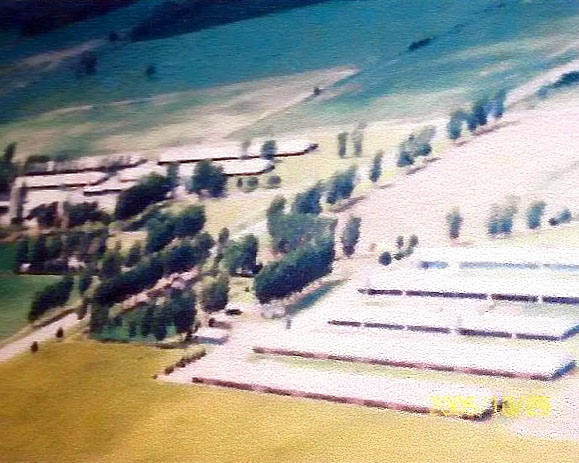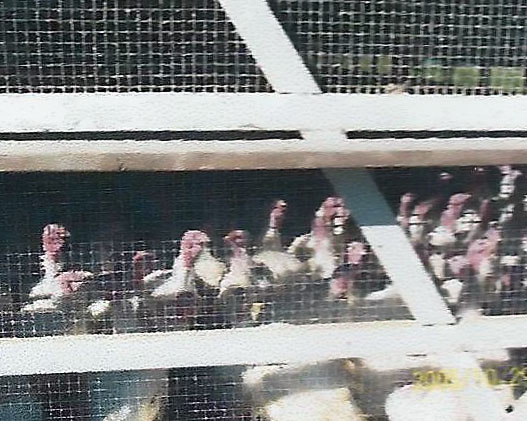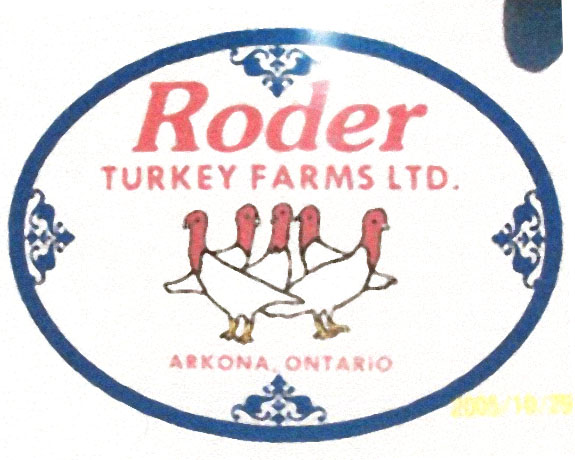Don McGugan sat down with Art Roder of Roder Turkey Farms Ltd in late October to talk about Roder Turkey Farms, some of his thoughts on agriculture and to discuss the award he won from the Lambton Soil and Crop Association.

Roder Farms from the air 

Don McGugan: Art, can we start with your background.
Art Roder: I was raised on the family farm here in Arkona, and then went to Ridgetown College where I graduated in 1975. I have been a Director of the Ontario Turkey Board from 1981 to the present and have been Chair for 15 years. I was a Director to Canadian Turkey Marketing Agency from 1983 to 1993 and was Chair between 1986 and 1989. I have been married to my wife, Janet for 30 years and have 2 children and 2 grandchildren.
DM: Could you tell us a little about the history of Roder Turkey Farms?
AR: The operation started in 1946 by my father, Allen Roder. We started processing turkeys on the farm in 1949 and then purchased an old cheese factory in Arkona in 1955 to set up a processing plant. Turkeys were mostly grown on range until 1969 when we started to build barns to house them indoors. Today we have 3 brooding barns where we receive the poults day old and grow them out in 9 growing barns. We raise about 130,000 turkeys a year.
We have purchased 6 neighboring farms from about 1960 to mid 1970s. These purchases were necessitated to deal with a growing volume of manure. The farms also produced corn for feed. Corn, soybeans and wheat are grown on these farms today in a rotation.
In 1999 we exited the processing business. The economics of meeting the federal regulations made continuing in that business impossible.
In 2001, we built a totally enclosed compost facility to deal with our manure. If we are unable to spread manure due to wet field conditions, manure can be diverted to the composter. We have not had to spread manure on frozen ground since about 1995.
In 2003, we became one of the first turkey farms in Ontario to be certified under the On-farm Food Safety Program. This HACCP (Hazard Analysis and Critical Control Point) based program ensures that the Turkeys marketed are of high quality, safe and wholesome for consumers. It allows traceback from the processing plant to the hatchery in the case of a food borne illness outbreak.
In 2004, we completed a Nutrient Management Plan. We are proud of the fact that we did not have to change any of our farming practices to meet the requirements of the new government regulations for dealing with nutrients applied to our soils.
DM: That is a very impressive history. Could you tell me a little about your view of the future, both for Roders and for agriculture in general?
AR: For Roders, we don’t have any real expansion plans right now, other than the normal keeping our barns in good shape and equipment up to date. We can produce more pounds now than in the past due to genetic improvements so there is not a big need to expand facilities.
We have enough land to spread our manure and the corn we grow is feed for the turkeys. Right now the cost to grow corn is greater than what we can buy it for, but what can you do?
As for agriculture in general, this depends on WTO trade talks and where the supply management system is going. If there is a level playing field, we can compete with anyone.
DM: So with all of the challenges that agriculture faces, what are the biggest challenges that Roders faces?
AR: Bio-security is, and always will be, a challenge for anyone involved with turkeys, chickens, and other birds. We don’t allow farm tours anymore due to the risk of contamination. None of our employees are allowed to have pet birds in their homes. There are foot baths in the buildings and all of our employees carry hand sanitizer with them at all times. All equipment is washed before going into a new barn.
DM: That leads me to a question about something in the headlines everyday now – the avian flu.
AR: Things are different here than in Asia. We don’t live with our birds here. Could it show up here in Canada – sure it could – but we have far more stringent rules and precautions here.
DM: Let’s talk about the award you won from the Lambton Soil and Crop Improvement Association.
AR: The award was based on a variety of criteria, including soil stewardship, community concern, and agriculture ambassador among other criteria.
I was surprised when we won. It tells me that someone noticed our operations and what we do. We take a great deal of pride in our work and are always trying to improve the land – we are stewards of it only for a while.
DM: Congratulations on winning the award. It is a great accomplishment. Now, you mentioned before that you were able to implement the Nutrient Management Plan without having to change your farming operations. Do you have any opinions on the Nutrient Management Plan?
AR: I have to give credit to the OFA for their ability to work with the government when the Nutrient Management Plan came out. I think it is a fairly sensible plan – maybe there isn’t enough government money behind it for the changes necessary, but that is the way it goes. At our farm, we made the changes years ago before the changes were mandated by the government. We didn’t have to change a thing on our farm when the Nutrient Management Plan came out.
DM: Do you have any final thoughts?
AR: We in agriculture are such a small part of the population but we are so important. People have to eat and urban people have no idea where food comes from. They really have lost touch with the producer and where food comes from. I don’t think that farmers are getting enough of a return from the market place and there are too few food purchasers for our products. Now, how do we turn this around? I don’t know.
DM: Art, thanks for your time this morning. This has been an interesting interview.
AR: You’re welcome Don.



